Derek Thompson's Blog, page 7
December 31, 2016
Observation Post
 Well, it's that time of the year again - a cross between the End Times and that moment when you're waiting for your train / plane to be announced for a trip you've been looking forward to. Or else it's another day before you have to remember to change the year when you date anything.
Well, it's that time of the year again - a cross between the End Times and that moment when you're waiting for your train / plane to be announced for a trip you've been looking forward to. Or else it's another day before you have to remember to change the year when you date anything.I find the days between Christmas and New Year a great opportunity to do the writing equivalent of gardening: tending the ground, pruning back, removing the debris and clearing away the cat poop.
In practice this means I:
1. Unsubscribe from those lists I stopped reading because I found they didn't fit my circumstances or aspirations.
2. Check for any unbilled invoices or incorrect payments (it happens from time to time).
3. Plan ahead for future column pieces and articles with perhaps a headline and some bullets.
4. Review my activities and progress via my trusty spreadsheet. (I could say I excel at that, but I think we're past the time for Christmas cracker puns).
A quick glance at the start of this year's blogdom is also on the cards:
http://alongthewritelines.blogspot.co.uk/2016/01/2016-new-manifesto.html
Books of note I read or re-read this year: The Art of Letting Go, The Maltese Falcon, Shakedown, On Writing, and Narrow Dog to Carcassonne. I also read one of my own - Shadow State - but that was mainly for editing purposes.
I stuck to my guns in offering a free hour every week to writers. Sometimes I offered it pro-actively and occasionally people sought me out. Mostly, they left me alone! I worked on a couple of synopses, discussed promotional ideas, posted blog interviews, wrote anonymous content for low budget projects and, on one occasion, was invited to be a news conduit for a global conspiracy. I think it's easy to help others at a grassroots level, but as you move up the slopes the help that people want is more specific, more time consuming and more reliant on having contacts and influence.
I also made my first foray into paid advertising, having tried a giveaway or two to see if it resulted in later sales or reviews (reader, it didn't!). My Book Tweet campaign delivered zero sales and my minimal outlay Facebook ad produced sub-minimal results. Undeterred, I shall be looking for a more targeted service in 2017, like other businesses.
2016 saw the launch of the Spy Chaser trilogy and Shadow Shadow, the fourth Thomas Bladen thriller, bringing my total Joffe Books' titles to five.
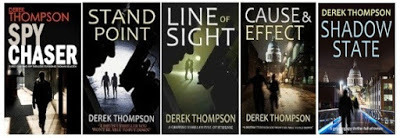 https://www.amazon.co.uk/Derek-Thompson/e/B0034ORY08I've had a great year as a writer and I'd like to thank everyone who had a hand in it. You know who you are and I don't want to risk leaving anyone out. A special mention to Anne though, without whom this writing adventure would not be possible.
https://www.amazon.co.uk/Derek-Thompson/e/B0034ORY08I've had a great year as a writer and I'd like to thank everyone who had a hand in it. You know who you are and I don't want to risk leaving anyone out. A special mention to Anne though, without whom this writing adventure would not be possible.In 2017, the plan is to...- Write the fifth Thomas Bladen book, No Defence.- Find an agent / publisher for Scars & Stripes. - Start pitching to see the Thomas Bladen series developed for other media.- Fail faster, be more daring and generally enjoy the ride more.
Have a good one and thanks for sticking around. Feel free to leave a comment about your creative plans for 2017 and your reflections on 2016.
Derek
Published on December 31, 2016 08:14
December 27, 2016
Two Magic Words
 Sometimes we have to draw a line in the sand - with a pen.When people learn - because I'm not exactly shy about it now - that I'm a writer the conversation usually goes one of two ways.
Sometimes we have to draw a line in the sand - with a pen.When people learn - because I'm not exactly shy about it now - that I'm a writer the conversation usually goes one of two ways. 1. They ask, directly or obliquely, how much money I make from books and freelancing.
2. They look for tips about how to start, how to continue, and how to get to the point where they can answer question one about themselves.
I still find it odd that people need to know about the money, in a way that doesn't apply to any other profession. "So, tell me, how much does a plumber / club singer / courier / midwife / potter make these days?" I think it's driven by a mixture of curiosity and hope. We, all of us, apparently have a book in us. Small wonder that we might want to know its probable value before we commit ourselves to the task. Similarly, for those who are already writers, whether published or not, there's a yearning to know that we will - like the good characters in the stories we grew up with - get our just reward in the end. The truth is much more fluid than that, depending upon the writing, timing, luck, the market, and other factors.
As to the second question, I could point you towards several leading lights in fiction and non-fiction who may help you on the path. Sinclair Macleod, Sue Louineau, Villayat Sunkmanitu and Rebsie Fairholm all gave me valuable insights about self-publishing. Some of the many agents (especially Andrew Lownie) and publishers who rejected my submissions also gave the odd hint about how to do it better the next time. Jane Pollard taught me a great deal about structure and depth. When it comes to non-fiction I am indebted, latterly, to Jon Morrow, Sophie Lizard, Mridu Khullar Relph and Carol Tice. None of this is news to anyone who reads this blog regularly.
However, I have picked up one tip along the way that makes a HUGE difference to every writer. It's not foolproof but, statistically speaking, it makes the greatest impact to improving your chances as a writer. Best of all, it's only two words (initially...). Ready?
Do something.
Start the page. End the paragraph. Finish the paragraph. Complete the novel. Endure the first edit (and all the others). Submit the work. Pitch. Adapt. Improve. Promote. Hustle, if that's your thing. Run a promotional campaign. Plan a strategy. Act on impulse. Write to other writers. Contact the TV folk. Sell yourself on radio.
Or...do nothing. It might be safer, less disappointing, cheaper on stamps, and easier to bear. You can tell yourself that you could have written a brilliant book, or that just so far is far enough. That could be true for you, in which case best move along here because I can only offer you one promise: If you do something that means something will have changed. And who knows where that might lead?!
It might be fame, it might be fortune, it might be a four-figure tax bill, it might be the realisation that your novel is too far ahead of its time (in which case why not write something different while you're waiting for the world to catch up?).
If you want to write you could turn out to be a journalist, blogger, poet, playwright, short storyist (yep, made that one up!), diarist, novelist, songwriter or penner of greetings cards. Give yourself over to the words and they will, at the very least, give you greater personal insight and may very well provide you with an adventure on and off the page.
At this time of year we generally promise ourselves to step up a gear come January 1st. Gym membership, new journal, new project. Why wait? Do something.
Published on December 27, 2016 12:19
December 20, 2016
Books as Children - Line of Sight's turn to shine
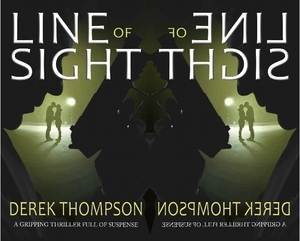 It's time for Thomas Bladen to go through the looking glass.A well-known author (Richard Bach, I'm fairly confident) once referred to his books as his literary children. When it comes to my Thomas Bladen Spy Chaser novels, I have tried to do something subtle different with each one. Consequently, I love all my literary children equally while recognising their differences.
It's time for Thomas Bladen to go through the looking glass.A well-known author (Richard Bach, I'm fairly confident) once referred to his books as his literary children. When it comes to my Thomas Bladen Spy Chaser novels, I have tried to do something subtle different with each one. Consequently, I love all my literary children equally while recognising their differences.Standpoint introduces Thomas Bladen and his work in the Surveillance Support Unit. It sets the tone, the alliances and the conflicts. Ideally, it also sets readers' expectations as they enter Thomas's world. It's the eldest child, who carries some responsibility for the children that follow - whether it likes it or not!
Line of Sight follows in the aftermath of the events in Standpoint. It delves deeper into Thomas's working relationship with Karl and the SSU, but also has Thomas taking more of a lead role. We see Karl vulnerable for the first time and we learn more about his backstory. Line of Sight, as the second child, has a touch of pathos about it.
Cause & Effect opens dramatically - twice! - before showing how Thomas's and Karl's lives are now so interwoven that one false move could ensnare them both. Crucially, this book shows both of them sometimes getting it wrong and the consequences. This third child is more independent than its older siblings, and perhaps a little more reckless too.
Shadow State puts Thomas Bladen centre stage, whether he likes it nor not. This time he calls the shots, and with good reason. The past catches up with him and Karl, leading to revelations, confrontations and hard choices. The fourth child benefits from the burdens and experiences of those who came before it. It is more wilful and less inclined to listen to its parents (the author!).
------------------------------------------
If you're not already completely frazzled by Christmas shopping, and even if you are, why not curl up with a good ebook, courtesy of me and Joffe Books?
Life of Sight is free to download between now and December 24th.
Find out why Amy Johanson died, why Karl McNeill hasn't set foot in Northern Ireland since he was a teenager, why Miranda Wright might not be the best person to deliver a eulogy but she'll cover your back, and why Thomas Bladen has to turn detective when no one else can.
UK https://www.amazon.co.uk/LINE-SIGHT-gripping-thriller-suspense-ebook/dp/B00XIOAOBK
US https://www.amazon.com/LINE-SIGHT-gripping-thriller-suspense-ebook/dp/B00XIOAOBK
AUS https://www.amazon.com.au/LINE-SIGHT-gripping-thriller-suspense-ebook/dp/B00XIOAOBK
CAN https://www.amazon.ca/LINE-SIGHT-gripping-thriller-suspense-ebook/dp/B00XIOAOBK
Published on December 20, 2016 05:29
FREE THRILLER DOWNLOAD!
 FREE THOMAS BLADEN DOWNLOAD DEC 20th to DEC 24th.
FREE THOMAS BLADEN DOWNLOAD DEC 20th to DEC 24th. What really happened to Amy Johanson? Why can't Karl McNeill go home, and what happens when he needs to? Where will Thomas Bladen draw the line?
US: https://www.amazon.com/LINE-SIGHT-gri...
UK: https://www.amazon.co.uk/LINE-SIGHT-g...
Line of Sight is the second book in the Thomas Bladen 'Spy Chaser' series. Working for the UK's Surveillance Support Unit has opened Thomas's eyes to the intelligence war against the Cartel. When an accident occurs on an army base, 'light duties' covering an arms demonstration turns into something far more sinister. What are they not supposed to discover? Join Thomas and Karl as they go into battle against the establishment.
Published on December 20, 2016 00:48
•
Tags:
british, line-of-sight, thomas-bladen, thriller
December 13, 2016
Are You Guilty of the Seven Deadly Sins of Novel Writing?
Are You Guilty of the Seven Deadly Sins of Novel Writing?
When I was a teen I went through a philosophical phase. One gem that has stayed with me ever since, associated with bushido and the code of the samurai is: Virtues are no less contagious than vices. Well, I enjoy a virtue as much as the next person, but I seem to learn more from my shadow side. And as confession is said to be good for the soul, I've made a list...
PrideSometimes it's called vanity and, in a sense, you might also call it naivety. Writing is a solitary process and one needs a certain humility to submit your work to other people's scrutiny. I don't think it's always necessarily linked to arrogance about one's own ability. No, I think it's sometimes recognising that showing other people your work meaning opening up the fault lines and laying bare all the work that still needs to be done.Warning phrases:"No one else ever could understand or appreciate my work.""I can do all the editing myself, thank you very much."
EnvyMost writers seem to look up the ladder rather than down. We yearn to be JK Rowling, or to get our book reviewed in national newspapers. Or our first thought, on hearing about someone else's literary (or financial) success, could serve as the plot of a murder mystery: The case of the lucky bugger who wasn't so lucky in the end. We forget that there are far more people behind us than ahead of us.Warning phrases:"It's alright for them.""Well, of course, when you know the right people anything is possible."
Greed & LustThis manifests as a desire to be a writer primarily for the pleasures and opportunities it brings. Fame and fortune are the common aspirations, although other literary fictions are available! It's a destination rather than a journey, which sees writing as a means to an imagined end where unmet needs are fulfilled. Rejections, negative reviews and publisher's edits all help brings authors back to earth.
Warning phrases:
"I want to work for three hours a day and create an instant bestseller."
"First I'll write the book and then get a film deal, and then the next year I'll do the same thing again. And then I'm set for life."
"Just another 20 reviews and then I'll be happy."
GluttonyFor writers this one manifests in very specific ways. The person in a writer's group who only comes to life when discussing their own work. The author who asks for blog posts and shares and votes yet rarely returns the favour. They want it all - even when they may seem to others to have it all - and they'd like your share too!
Warning phrases:
"As you helped me before with my other books..."
"Sadly, my busy writing schedule means I couldn't possibly spare the time to reciprocate."
WrathA writer's wrath will usually feel justified - to them, anyway. It can be triggered by various situations, including: someone else's success, your own characters answering back, a realisation that your first 10,000 words on this book will also the last because it's not working, a painful review, or any other aspect of being a writer that is beyond your control. (Which is actually most of it, beyond writing and editing.)
Warning phrases:
"How dare they!"
"I deserve better than this."
SlothWriting can be a painful business, filled with doubt and uncertainty. When you start page one you have no idea whether the story is sustainable and let's not even get into whether it will be published or be well received. In the beginning there's just you and those blank pages. There is never a perfect time to write!
Warning phrases:
"I'll start my book when I feel truly inspired."
"If it's meant to be it will happen effortlessly."
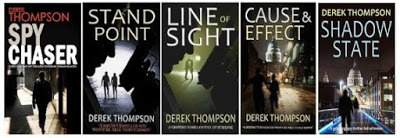
UK: https://www.amazon.co.uk/Derek-Thompson/e/B0034ORY08
US: https://www.amazon.com/Derek-Thompson/e/B0034ORY08
Published on December 13, 2016 08:58
November 29, 2016
More fun with numbers
Everybody loves a sequel, right? Terminator 2, Airplane 2, Dogma 2 (just in case Kevin Smith is out there reading this...). Back in 2015 I wrote a blog post that generated a bit of a debate with fellow writers - but no comments! - and it's time for a follow-up.
Since June 2015 two books has become four / five and I have a bit more experience of the other side of writing - namely, the marketing and promotions that accompanies publication.
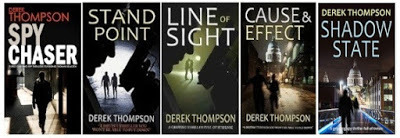
Perhaps it's no surprise that many writers and other creatives embrace the idea of magical thinking. Once you've faced a blank canvas or page and subsequently produced a piece of work that you only half recognise as your own, it's small wonder that you become open to alternative ways to viewing reality. It can manifest as superstitions, such as the lucky notebook or pen. Those with experience of NLP might consider this a form of anchor. I'll declare here that I have a special pen for contracts, but not one for getting them! Anyway, my point here is that I'm not against magical thinking if it serves as a motivation to do something.
When it comes to reaching readers, which naturally encompasses sales as well, magical thinking can quickly dissipate in the harsh glare of numbers. The idea that 'if you build it they will come' is just that: an idea. The question is, what do you do if they fail to show up?
Most writers are looking for a magical formula that promises certainty and success, despite overwhelming evidence to the contrary. Ah hah, they say, but I have a plan! And it's true, some writers will buck the trend and catch the wave at the perfect moment. After all, some has to win the draw for the lottery. Sean Platt, Johnny B Truant and David Wright have a more pragmatic approach: Write. Publish. Repeat.
I decided to experiment with my back catalogue. First up was Covenant, a magical fantasy that earned a clutch of good reviews but had never found a wider audience. Which is to say, it has never made any money! I found a Book Tweeting service online, which sends out 30 tweets a month from each of four accounts, with a reach of over 195,000 follows on Twitter. I confirmed they had covered fantasy novels before and, naturally, accepted that there were no guarantees. The tweets used quotes from the blurb I provided or key words, along with the all important title and sales link.
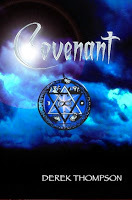
I opted for a trial month and then I'd look at the numbers for the following couple of months. Total sales for the month and tweets and the two months that followed? Zero. Nada. Zip. Ouch!
Next up in my back catalogue adventure was the collection of mini ebooks - themed collections of 100 or so gags. They're already priced as low as you can go (apart from free), so I thought I'd try something different. I would offer them for free, use TweetDeck to run my own short Twitter campaign, and pitch them as review copies to get some online feedback.
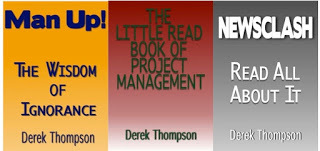
The good news: 84 free downloads across the set.
The not so good news, and I have a feeling you're ahead of me here: zero reviews.
Here's what I take away from this:
1. Organic promotions are only effective if you already have - or are part of - an active community. Treat your readers with respect though and never forget that they are giving you their valuable time and some cash too.
2. If you decide to pay for marketing / promotions research thoroughly and invest in quality.
My experiences suggest that you do indeed get what you paid for.
3. Experiment. It's all a game of trial and review and adjustment.
4. None of the above should interfere with the writing. After all, that's what writers do.
Thanks for your time.
Derek
https://www.amazon.co.uk/Derek-Thompson/e/B0034ORY08
Since June 2015 two books has become four / five and I have a bit more experience of the other side of writing - namely, the marketing and promotions that accompanies publication.

Perhaps it's no surprise that many writers and other creatives embrace the idea of magical thinking. Once you've faced a blank canvas or page and subsequently produced a piece of work that you only half recognise as your own, it's small wonder that you become open to alternative ways to viewing reality. It can manifest as superstitions, such as the lucky notebook or pen. Those with experience of NLP might consider this a form of anchor. I'll declare here that I have a special pen for contracts, but not one for getting them! Anyway, my point here is that I'm not against magical thinking if it serves as a motivation to do something.
When it comes to reaching readers, which naturally encompasses sales as well, magical thinking can quickly dissipate in the harsh glare of numbers. The idea that 'if you build it they will come' is just that: an idea. The question is, what do you do if they fail to show up?
Most writers are looking for a magical formula that promises certainty and success, despite overwhelming evidence to the contrary. Ah hah, they say, but I have a plan! And it's true, some writers will buck the trend and catch the wave at the perfect moment. After all, some has to win the draw for the lottery. Sean Platt, Johnny B Truant and David Wright have a more pragmatic approach: Write. Publish. Repeat.
I decided to experiment with my back catalogue. First up was Covenant, a magical fantasy that earned a clutch of good reviews but had never found a wider audience. Which is to say, it has never made any money! I found a Book Tweeting service online, which sends out 30 tweets a month from each of four accounts, with a reach of over 195,000 follows on Twitter. I confirmed they had covered fantasy novels before and, naturally, accepted that there were no guarantees. The tweets used quotes from the blurb I provided or key words, along with the all important title and sales link.

I opted for a trial month and then I'd look at the numbers for the following couple of months. Total sales for the month and tweets and the two months that followed? Zero. Nada. Zip. Ouch!
Next up in my back catalogue adventure was the collection of mini ebooks - themed collections of 100 or so gags. They're already priced as low as you can go (apart from free), so I thought I'd try something different. I would offer them for free, use TweetDeck to run my own short Twitter campaign, and pitch them as review copies to get some online feedback.

The good news: 84 free downloads across the set.
The not so good news, and I have a feeling you're ahead of me here: zero reviews.
Here's what I take away from this:
1. Organic promotions are only effective if you already have - or are part of - an active community. Treat your readers with respect though and never forget that they are giving you their valuable time and some cash too.
2. If you decide to pay for marketing / promotions research thoroughly and invest in quality.
My experiences suggest that you do indeed get what you paid for.
3. Experiment. It's all a game of trial and review and adjustment.
4. None of the above should interfere with the writing. After all, that's what writers do.
Thanks for your time.
Derek
https://www.amazon.co.uk/Derek-Thompson/e/B0034ORY08
Published on November 29, 2016 03:38
November 14, 2016
Shadow State - using the force
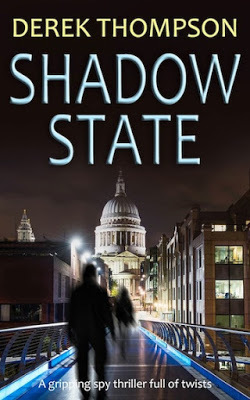 Even if you don't believe in destiny you probably accept the word of Sir Isaac Newton. His 'three laws', unlike Isaac Asimov's (now that's what I call a literary reference), underpin not only our understanding of physics, but also of daily life and writing.
Even if you don't believe in destiny you probably accept the word of Sir Isaac Newton. His 'three laws', unlike Isaac Asimov's (now that's what I call a literary reference), underpin not only our understanding of physics, but also of daily life and writing.The First Law states that:
a) An object at rest remains at rest unless a force acts upon it.
b) An object in motion stays that way - same direction and speed - unless a force acts upon it.
Simply put, in fiction something has to happen in order for something to change, whether the outcome is progressive or regressive. You could argue that every twist and turn in a novel is really a Newtonian force zinging into the protagonist from an unanticipated angle.
I'm more of a plotter than a pantser when it comes to putting together a story, but I welcome an unexpected inspiration that careers towards me and knocks a character out of the picture or into it. Shadow State, the fourth book in the Thomas Bladen 'Spy Chaser' series owes a debt to Newton. I thought I had the plot figured out and my characters were moving purposefully towards the checkpoints on my writing roadmap. (I know, it makes writing sounds really romantic, huh?)
And then...out the corner of my mind's eye, this speck of light, this flicker of 'what if' from the muse slammed into my carefully constructed plot. Okay, carefully might be overstating it a bit. But the result was surprising. A character did something unexpected and I had a choice of whether to run with it and see where it led, or to rein them in and remind them that it was my ball and therefore my rules. I went with Plan A, trusting the character I thought I'd created - we can debate that one on a chair and couch some other time - and ended up somewhere else. It was different to my original vision and I liked it. Writers like to be surprised. It keeps us on our toes and it's a great reminder that we are engaging with a fluid and mimetic imagination.
You could say that Shadow State is something of an experiment in places. It features many characters from the series and a couple of new ones. It redraws the map in places, as far as loyalties go, and it peels back the layers a little more of the characters we think we know. It plays with some of the conventions and, I hope, it adds something special to the canon.
If you're drawn to British spy thrillers that give a nod to Len Deighton, John le Carre, Raymond Chandler, and Harlan Coben, Shadow State might be just your cup of coffee. Intrigue, action, sardonic humour and swearing - what's not to like?
SHADOW STATEThomas Bladen thinks he is in control. He's wrong. When Thomas is confronted by a Shadow State operative, he is given a stark choice - expose a defector or face the consequences. But who is the real enemy? A stake out becomes a rescue, an intervention leads to murder and loyalties are stretched to breaking point. Soon Thomas is forced into a dangerous game, turning the Shadow State against itself.
"Good spy thriller with a appealing flawed hero in Bladen. Liked the London life evoked!"
Shadow State is published by Joffe Books. Come and meet Thomas Bladen.
UK https://www.amazon.co.uk/Derek-Thompson/e/B0034ORY08
US https://www.amazon.com/Derek-Thompson/e/B0034ORY08

Published on November 14, 2016 08:20
November 13, 2016
Shadow State has launched!
Hi everyone, the fourth instalment of the Thomas Bladen thriller series is now available.
Check out Amazon this week for a 99p / $1.23 sweet deal.
Amazon US https://www.amazon.com/dp/B01N3N2BJM
Amazon UK https://www.amazon.co.uk/dp/B01N3N2BJM
Best regards,
Derek
Check out Amazon this week for a 99p / $1.23 sweet deal.
Amazon US https://www.amazon.com/dp/B01N3N2BJM
Amazon UK https://www.amazon.co.uk/dp/B01N3N2BJM
Best regards,
Derek
Published on November 13, 2016 09:27
•
Tags:
british, derek-thompson, espionage, joffe-books, shadow-state, spy, thomas-bladen, thriller
November 5, 2016
The Information Game
 LayersEven before I became an emerging author (that middle ground between no longer debut and nowhere near established!) I thought it sensible to turn a well-worn adage, 'write about what you know', on its head. Far better, in my opinion, to say: 'know what you're writing about'.
LayersEven before I became an emerging author (that middle ground between no longer debut and nowhere near established!) I thought it sensible to turn a well-worn adage, 'write about what you know', on its head. Far better, in my opinion, to say: 'know what you're writing about'.That usually means one of two things:
1. Direct research.2. Indirect research by plundering your own experience, and sometimes other people's.
While the novelist Leigh Russell made a trip to the Seychelles for her novel, Journey to Death, my research tales are of a more bargain basement variety!
For my debut espionage thriller, Standpoint, I wanted to know about Harwich International Port. Unfortunately, I went at it with some gusto and my enthusiastic request to see detailed maps and to know about the locations and practices of Customs staff probably had me pegged as an inept smuggler. Perhaps I should be grateful that I never received a reply, especially one that involved the removal of my front door. I did, however, pick up a useful police contact.
When it came to writing the sequel, Line of Sight, I found useful information on www.arrse.co.ukand www.ukpoliceonline.co.ukfor matters relating to mob and job. I also drew upon memories and anecdotes from brief stints working in Belfast, and those of a friend who'd served in the Armed Forces out there.
By book three, Cause & Effect, I must have got better at asking questions. Plus, I now had a little credibility from the previous two novels. In my explorations I inadvertently found out something about baggage scanners that I'm not allowed to reveal, a bank provided information about bankcard fraud - on the condition that I don't name them, and someone from the Ministry of Justice referred me to the excellent http://www.insidetime.orgfor a question about prison procedures in 2004. Sadly, my query involving aerosol spray paints drew a blank so I fell back on my imagination. It seems there are some things that even the Internet can't tell us.
In almost all of the above cases the information I acquired (or failed to) was largely for my own benefit. Very little of it made the cut and I've yet to have a review that picks me up on my research (not so with the British slang, swearing, sex, violence, etc.). One thing I did learn, which still surprises me, is that I already knew several people with firearms experience.
A sprinkling of facts, at the right time and in the right manner, adds to the realism of a fictional world and encourages that suspension of disbelief we're always hearing about. Readers want characters and books that live on in their head after the final page, and we want them to want to return to the worlds we create.
Next time I might take a gander at international politics and US intelligence policy in post-war Europe.
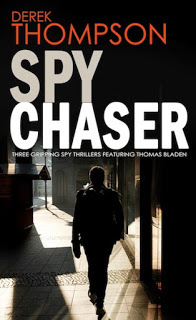
About meI have written three Thomas Bladen espionage thrillers, published by Joffe Books in one volume as Spy Chaser and also available separately - Standpoint, Line of Sight, and Cause& Effect. Shadow State, the fourth book in the series, is due out later this year. You can find details of all my books here.
Published on November 05, 2016 13:24
October 16, 2016
Stand by Your Plan
 A lightbulb moment without the bulb.Recently, a flurry of LinkedIn messages (thanks, all, by the way) reminded me that this is the anniversary month for daring to stick my head above the parapet and call myself a writer - for pay.
A lightbulb moment without the bulb.Recently, a flurry of LinkedIn messages (thanks, all, by the way) reminded me that this is the anniversary month for daring to stick my head above the parapet and call myself a writer - for pay. I did things a little out of sequence, having previously reached two writing milestones:
a) The Little Book of Cynics, which I co-wrote with David French, was published by Crombie Jardine - it's now available here.
b) I had a feature published in a national newspaper - here's an online version.
However, to all intents and purposes I became a professional writer after leaving my long-term employer through redundancy.
Did I have a plan? Not exactly.
I had a wish list, sorta. It went something like this:
1. Write the two novels I never had time for.
2. Get books published.
3. Earn a living as a freelance writer.
LESSON 1: The only things that generally grow well organically are vegetables.
It has been a meandering and sometimes bumpy road, with a few interesting detours. I've written features and blogs, ghostwritten three series of content for different clients, penned a few greetings cards, been a magazine columnist four times and I'm currently awaiting the publication of my fourth thriller. (I can hear the party poppers from here.)
However, at the risk of mixing my travelling metaphors it has not all been plain sailing. Along the way I've also temped and worked part-time in an office to cover the bills (which has been great for keeping touch with the outer world).
And the plan? Well, it's more defined now and still, I'm pleased to say, a work in progress.
LESSON 2: A plan is not a guarantee of success. Working to a plan is a guarantee of focus though.
Planning is about setting direction, setting boundaries and setting priorities. As a former project manager I'd say it is very much about monitoring and controlling. We may not be able to control the income at the start of a business, but we can control how our time and effort are spent. Mridu Khullar Relph, for example, advocates 30 pitches in 30 days, while other actively encourage a timetable to allocate time meaningfully and to create space.
From the discussions I've had, some writers fear space - they consider it idle time, or that they're not working hard enough. I don't think writing is like that; not for me anyway. The most successful work I ever did with greetings cards came from half an hour I deliberately set aside just to think about and play with words. While my rational brain screamed that it wasn't real work my irrational, subconscious got on with the business of creating. The result? £500 of material. Reader, that was a very good day.
LESSON 3: A plan needs to be reviewed regularly.
When I first started out I checked all the usual suspects for freelance writing work. I was the grist of content mills on many an occasion, and even tried to 'build up my following' on free content sites (free for the writers, anyway) in an effort to follow a supposedly surefire revenue model. To be fair, it probably was for the sites' owners (yes, more than once...) who earned advertising revenue from our endeavours. By checking back with the plan and by monitoring progress I could see what was working and what wasn't. Most of it wasn't. When we embrace the space we are more willing to let go of any actions or strategies that are ineffective (that simply fill our time and make us feel like we're doing something useful).
I was both industrious and fortunate - a great combination. I wrote my books, found a publisher who was looking for a thriller series (still working on that one for the standalone novel) and built a solid foundation as a freelancer. Now my plan is all about what happens next. News to follow in due course!
Thanks for stopping by and do get in touch if you need a writer.
Derek
Published on October 16, 2016 07:12



